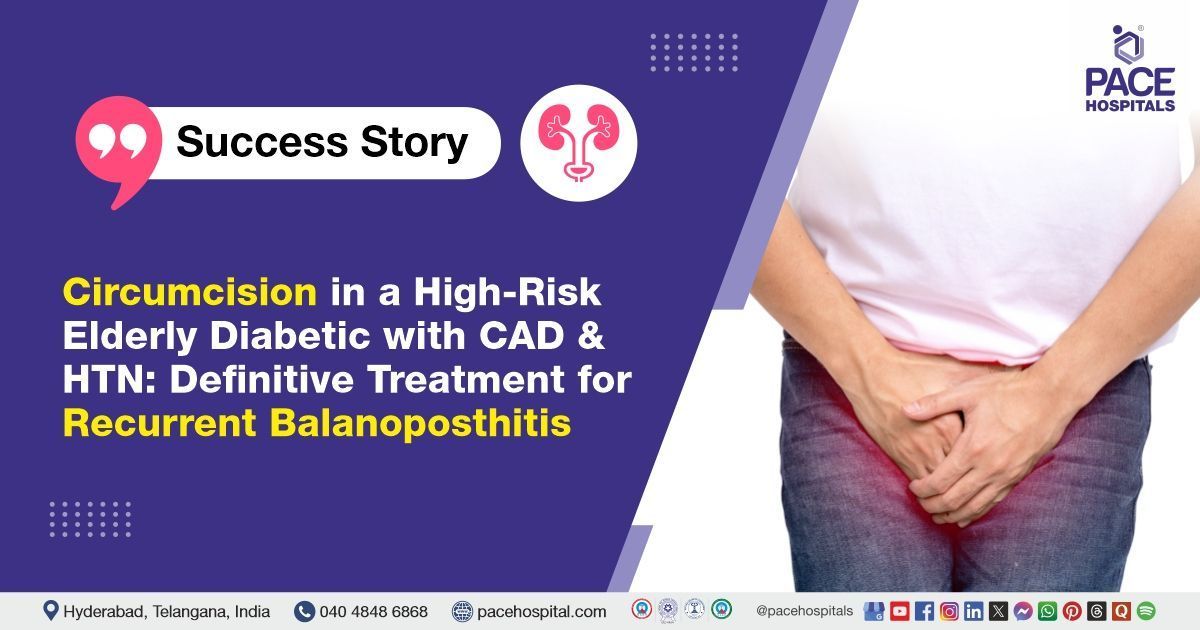Circumcision for Recurrent Balanoposthitis in Diabetic Elder with CAD, HTN
PACE Hospitals
The urologists team at PACE Hospitals successfully performed a circumcision, a definitive recurrent balanoposthitis treatment in Hyderabad, India under spinal anaesthesia for a 68-year-old male patient with refractory balanoposthitis, resolving chronic inflammation and preventing future complications.
Chief Complaints
68-year-old male patient from Madhapur, presented to the Urology Department at
PACE Hospitals, Hitech City, Hyderabad, with a chief complaint of recurrent balanoposthitis characterized by persistent inflammation of the foreskin and glans penis, causing significant discomfort and hygiene difficulties, which had failed to resolve with conservative management and necessitated surgical intervention.
Medical History
A thorough review of the patient’s medical background revealed that the patient had a significant medical history including well-controlled
diabetes mellitus,
hypertension, and
coronary artery disease (CAD), all managed with regular medications. His recurrent balanoposthitis was particularly concerning given his diabetic status, which predisposed him to infections, and his antiplatelet medication for coronary artery disease was temporarily discontinued to minimize bleeding risk during and after the operation.
On Examination
Clinical assessment of the genital region revealed pronounced inflammatory changes, consistent with chronic balanoposthitis. Notably, there were no signs of systemic infection or compromised regional vasculature noted during the evaluation.
Diagnosis
Through comprehensive clinical evaluation, the patient was diagnosed with recurrent balanoposthitis, a chronic inflammatory condition of the foreskin and glans penis characterized by repeated episodes of infection and irritation.
While his hypertension and coronary artery disease were well-controlled with medication, his history of diabetes mellitus even with adequate glycaemic control, remained a significant predisposing factor for these recurrent genital infections, as hyperglycaemia can impair local immune defences and tissue healing.
Medical Decision Making
Given the recurrent nature of the patient's balanoposthitis, Dr. Abhik Debnath, Consultant Laparoscopic Urologist and Andrologist in Hyderabad at PACE Hospitals, advised circumcision as the definitive treatment. This recommendation followed a comprehensive assessment of the patient's surgical risk factors, including age, diabetic status, and cardiovascular history, with meticulous preoperative optimization involving glycaemic control and temporary discontinuation of antiplatelet therapy.
Surgical Procedure
The patient underwent circumcision in Hyderabad at PACE Hospitals under spinal anaesthesia, intraoperative findings confirmed the presence of chronic foreskin inflammation without evidence of more severe pathology such as phimosis or paraphimosis, the procedure was performed without complications, with minimal blood loss, and the patient remained hemodynamically stable throughout the operation.
The circumcision procedure adheres to internationally accepted surgical protocols, ensuring optimal outcomes for complex urological cases. This approach combines precision techniques with stringent perioperative care, particularly for high-risk patients with comorbidities
Postoperative Care
Following the procedure, the patient was monitored in the surgical intensive care unit (SICU) where he received regular wound care with dressing changes. His postoperative course was uneventful with adequate pain control achieved through prescribed analgesics, and he was maintained on prophylactic antibiotics to prevent surgical site infection, and his blood glucose levels were closely monitored.
Discharge Medications
Upon discharge on the same day of surgery, the patient was prescribed a five-day course of an oral antibiotic twice daily as antibiotic prophylaxis, a non-opioid analgesic and antipyretic agent thrice daily for five days for postoperative pain management, a proton pump inhibitor once daily before breakfast for seven days for gastric protection, and an anti-inflammatory enzyme medication thrice daily for seven days to reduce inflammation. His regular medications for diabetes & hypertension, were continued as before, while his regular antiplatelet therapy was to be withheld for 12 days post-procedure.
Dietary Advice
The patient was advised to maintain a strict diabetic diet to ensure optimal glycaemic control during the postoperative recovery period, which is particularly important for wound healing and prevention of infections in diabetic patients undergoing surgical procedures.
Advice on Discharge
To ensure optimal recovery, the patient received comprehensive postoperative instructions including strict wound care protocols and medication adherence. He was directed to continue his prescribed antibiotic, analgesic, and gastric protection regimen as outlined. Crucially, he was cautioned to watch for red flags like fever, abnormal swelling, or pus discharge that might require emergency evaluation. His discharge plan emphasized the importance of keeping the antiplatelet therapy paused for the recommended two-week period unless otherwise advised.
Follow-Up
A scheduled follow-up appointment was arranged after 3 days, with Dr. Abhik Debnath in the urology outpatient department to assess wound healing and ensure no postoperative complications had developed.
Therapeutic Role of Circumcision in Recurrent Balanoposthitis Management
Circumcision serves as the definitive surgical treatment performed by a urologist/urology doctor for recurrent balanoposthitis, particularly in immunocompromised patients such as diabetics, by permanently eliminating the preputial environment that promotes microbial colonization and chronic inflammation. The procedure follows standardized surgical protocols involving meticulous tissue handling, rigorous aseptic techniques, and precision anatomical reconstruction to ensure optimal functional and cosmetic outcomes.
Particular attention is given to comprehensive preoperative optimization of comorbidities, continuous intraoperative hemodynamic monitoring, and tailored postoperative analgesia and wound care management. This systematic approach to the circumcision procedure combines evidence-based surgical principles with stringent safety protocols throughout the perioperative period, resulting in consistent therapeutic outcomes for this challenging urological condition.
The intervention's efficacy stems from its ability to address the underlying pathophysiology rather than providing temporary symptomatic relief, making it particularly valuable for high-risk patient populations with recurrent infections.
Share on
Request an appointment
Fill in the appointment form or call us instantly to book a confirmed appointment with our super specialist at 04048486868
Appointment request - health articles
Recent Articles











